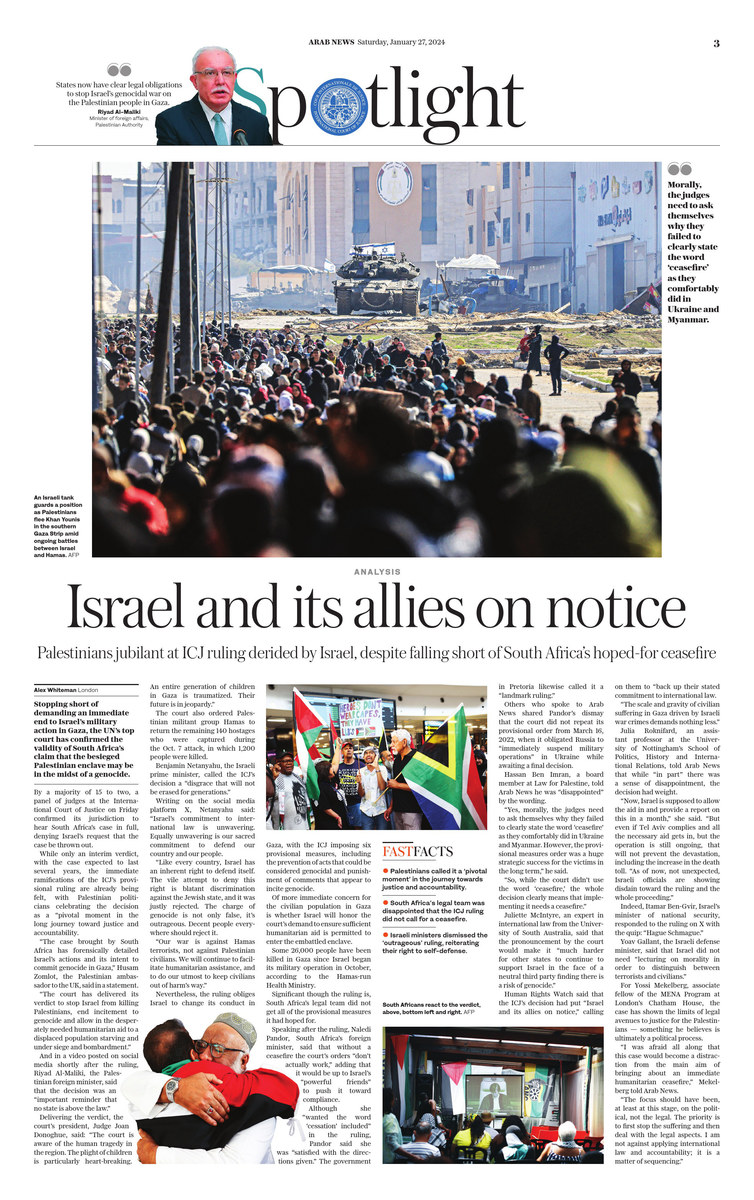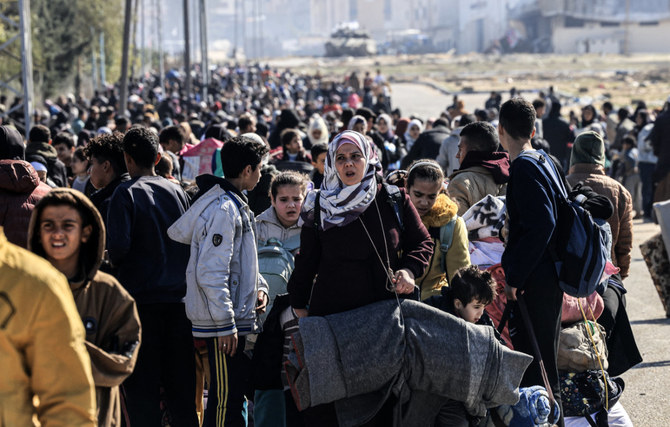LONDON: Stopping short of demanding an immediate end to Israel’s military action in Gaza, the UN’s top court has confirmed the validity of South Africa’s claim that the besieged Palestinian enclave may be in the midst of a genocide.
By a majority of 15 to two, a panel of judges at the International Court of Justice on Friday confirmed its jurisdiction to hear South Africa’s case in full, denying Israel’s request that the case be thrown out.
While only an interim verdict, with the case expected to last several years, the immediate ramifications of the ICJ’s provisional ruling are already being felt, with Palestinian politicians celebrating the decision as a “pivotal moment in the long journey toward justice and accountability.
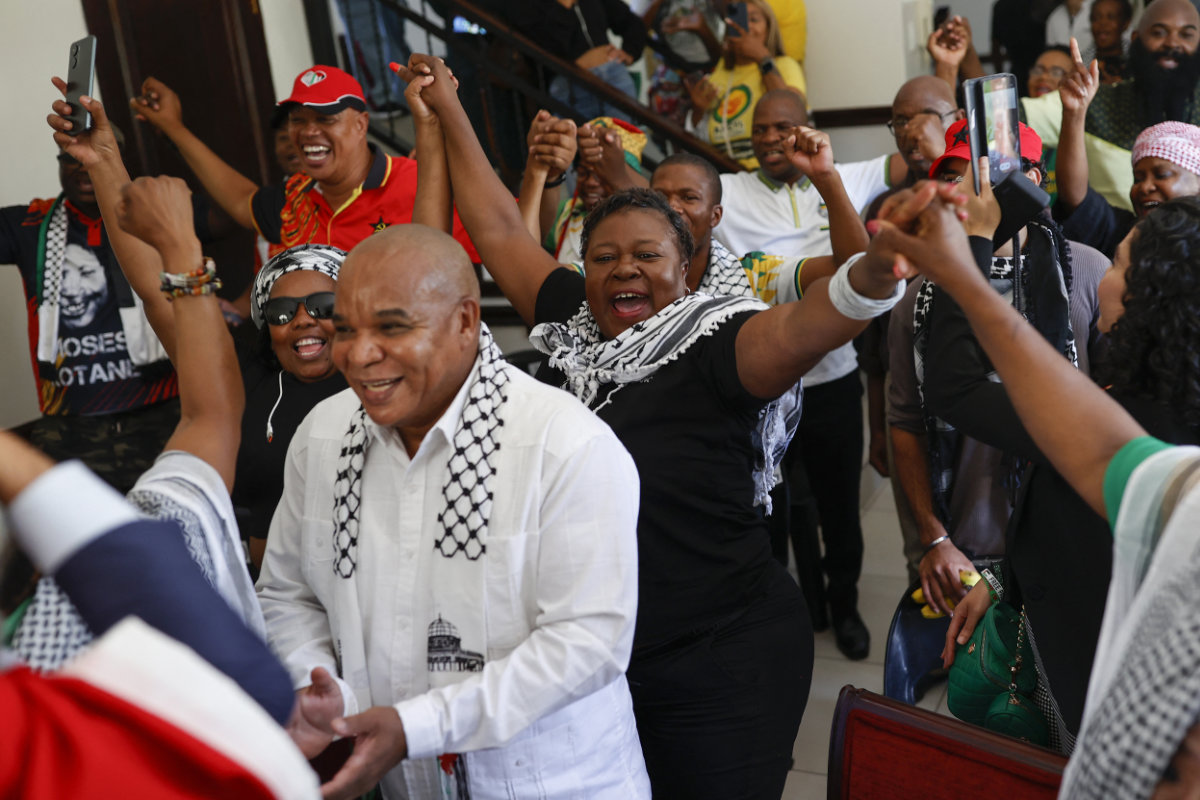
Pro-Palestinian supporters gathered at the Embassy of Palestine in Pretoria on January 26, 2024, rejoice after watching the International Court of Justice delivering its decision on the case against Israel brought by South Africa in The Hague. (AFP)
“The case brought by South Africa has forensically detailed Israel’s actions and its intent to commit genocide in Gaza,” Husam Zomlot, the Palestinian ambassador to the UK, said in a statement.
“The court has delivered its verdict to stop Israel from killing Palestinians, end incitement to genocide and allow in the desperately needed humanitarian aid to a displaced population starving and under siege and bombardment.”
And in a video posted on social media shortly after the ruling, Riyad Al-Maliki, the Palestinian foreign minister, said that the decision was an “important reminder that no state is above the law.”
Delivering the verdict, the court’s president, Judge Joan Donoghue, said: “The court is aware of the human tragedy in the region. The plight of children is particularly heart-breaking. An entire generation of children in Gaza is traumatized. Their future is in jeopardy.”
The court also ordered Palestinian militant group Hamas to return the remaining 140 hostages who were captured during the Oct. 7 attack, in which 1,200 people were killed.
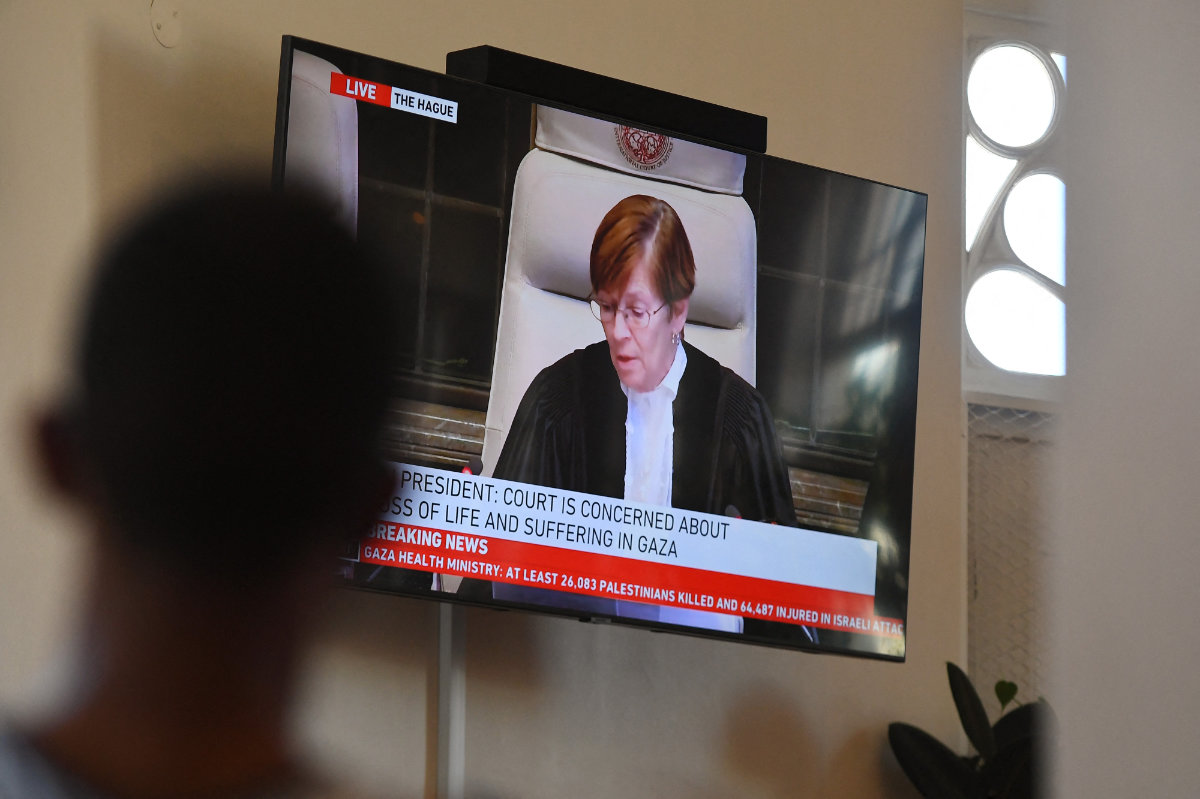
People gather at the Bertha House in Cape Town on January 26, 2024, to watch the World Court ruling of the case brought against Israel by South Africa in The Hague. (AFP)
Benjamin Netanyahu, the Israeli prime minister, called the ICJ’s decision a “disgrace that will not be erased for generations.”
Writing on the social media platform X, Netanyahu said: “Israel’s commitment to international law is unwavering. Equally unwavering is our sacred commitment to defend our country and our people.
“Like every country, Israel has an inherent right to defend itself. The vile attempt to deny this right is blatant discrimination against the Jewish state, and it was justly rejected. The charge of genocide is not only false, it’s outrageous. Decent people everywhere should reject it.
“Our war is against Hamas terrorists, not against Palestinian civilians. We will continue to facilitate humanitarian assistance, and to do our utmost to keep civilians out of harm’s way.”
Nevertheless, the ruling obliges Israel to change its conduct in Gaza, with the ICJ imposing six provisional measures, including the prevention of acts that could be considered genocidal and punishment of comments that appear to incite genocide.
Of more immediate concern for the civilian population in Gaza is whether Israel will honor the court’s demand to ensure sufficient humanitarian aid is permitted to enter the embattled enclave to stave off famine.
Some 26,000 people have been killed in Gaza since Israel began its military operation in October, according to the Hamas-run Health Ministry, and most of the enclave’s population has been displaced by the fighting.
Significant though the ruling is, South Africa’s legal team did not get all of the provisional measures it had hoped for.
Speaking after the ruling, Naledi Pandor, South Africa’s foreign minister, said that without a ceasefire the court’s orders “don’t actually work,” adding that it would be up to Israel’s “powerful friends” to push it toward compliance.
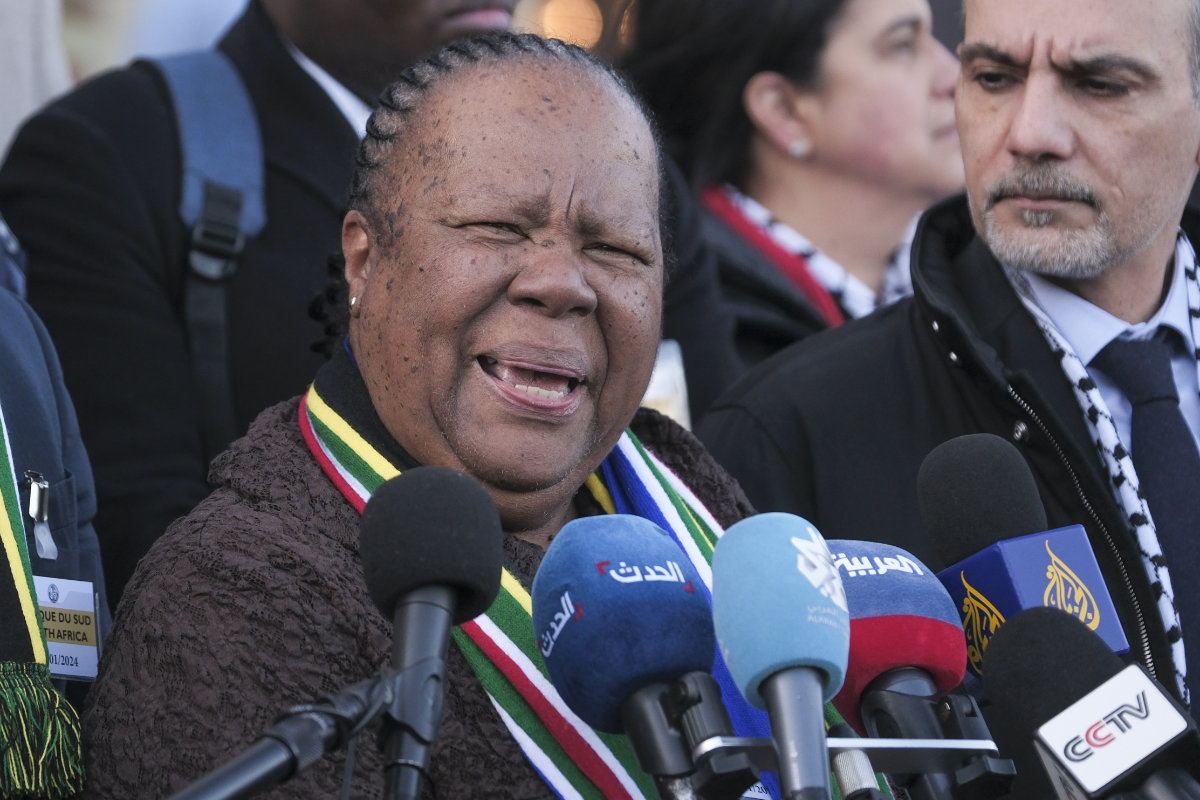
South Africa's Foreign Minister Naledi Pandor addresses reporters after the session of the World Court in The Hague, Netherlands, on Jan. 26, 2024. (AP)
Although she “wanted the word ‘cessation’ included” in the ruling, Pandor said she was “satisfied with the directions given.” The government in Pretoria likewise called it a “landmark ruling.”
Others who spoke to Arab News shared Pandor’s dismay that the court did not repeat its provisional order from March 16, 2022, when it obligated Russia to “immediately suspend military operations” in Ukraine while awaiting a final decision.
Hassan Ben Imran, a board member at Law for Palestine, told Arab News he was “disappointed” by the wording.
“Yes, morally, the judges need to ask themselves why they failed to clearly state the word ‘ceasefire’ as they comfortably did in Ukraine and Myanmar. However, the provisional measures order was a huge strategic success for the victims in the long term,” he said.
“So, while the court didn’t use the word ‘ceasefire,’ the whole decision clearly means that implementing it needs a ceasefire.”
Opinion
This section contains relevant reference points, placed in (Opinion field)
Similarly, Juliette McIntyre, an expert in international law from the University of South Australia, said that the pronouncement by the court would make it “much harder for other states to continue to support Israel in the face of a neutral third party finding there is a risk of genocide.”
This, McIntyre added, may lead to states withdrawing “military or other support for Israel in order to avoid this,” with the US purportedly following developments closely.
Across Europe, pressure has begun to mount on governments to act on the ruling, with the Scottish National Party warning that UK Prime Minister Rishi Sunak “can no longer remain silent on atrocities being committed in Gaza.”
Similarly, New York City-based monitor Human Rights Watch said that the ICJ’s decision had put “Israel and its allies on notice,” calling on them to “back up their stated commitment to international law.
“Governments need to urgently use their leverage to ensure that the order is enforced,” Balkees Jarrah, associate international justice director at HRW, said in a statement after the ruling.
“The scale and gravity of civilian suffering in Gaza driven by Israeli war crimes demands nothing less.”
Pandor highlighted that the ruling’s success depended on international powers, telling reporters she has “never really been hopeful about Israel” complying with the court’s orders.
Julia Roknifard, an assistant professor at the University of Nottingham’s School of Politics, History and International Relations, told Arab News that while “in part” there was a sense of disappointment that the ICJ had not demanded a ceasefire as it had with Russia, the decision had weight.
“Now, Israel is supposed to allow the aid in and provide a report on this in a month,” she said. “But even if Tel Aviv complies and all the necessary aid gets in, but the operation is still ongoing, that will not prevent the devastation, including the increase in the death toll.
“As of now, not unexpected, Israeli officials are showing disdain toward the ruling and the whole proceeding.”
Indeed, Itamar Ben-Gvir, Israel’s minister of national security, responded to the ruling on X with the quip: “Hague Schmague.”

Israel's National Security Minister Itamar Ben-Gvir. (AFP)
Unlike Ben-Gvir, the Israel Defense Forces may be taking the court’s ruling more seriously, with reports that it has already altered tactics to comply with the ICJ.
Although Arab News was unable to verify these changes, sources have reported in recent weeks of a growing chasm between Israel’s military and political leadership on how the war is being fought.
For now, however, the Israeli government appears to be resolutely against the ruling. Yoav Gallant, the Israeli defense minister, said that Israel did not need “lecturing on morality in order to distinguish between terrorists and civilians.”
He added that the IDF would “continue operating to dismantle the military and governing capabilities of the Hamas terrorist organization, and to return the hostages to their homes.”
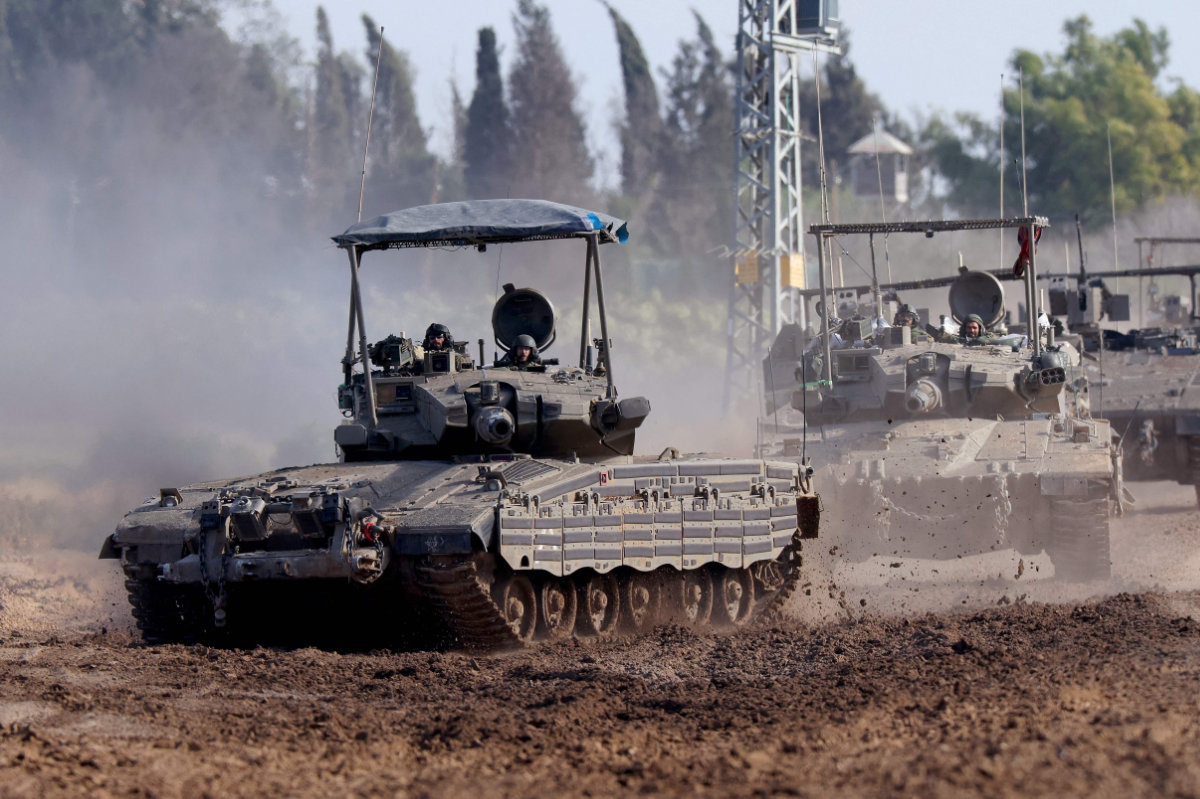
Israeli army tanks roll in southern Israel along the border with the Gaza Strip on January 24, 2024 amid ongoing battles between Israel and the Palestinian militant group Hamas. (AFP)
For Yossi Mekelberg, associate fellow of the MENA Program at London’s Chatham House, the case has shown the limits of legal avenues to justice for the Palestinians — something he believes is ultimately a political process.
“I was afraid all along that this case would become a distraction from the main aim of bringing about an immediate humanitarian ceasefire,” Mekelberg told Arab News.
“The focus should have been, at least at this stage, on the political, not the legal. The priority is to first stop the suffering and then deal with the legal aspects. I am not against applying international law and accountability; it is a matter of sequencing.”
